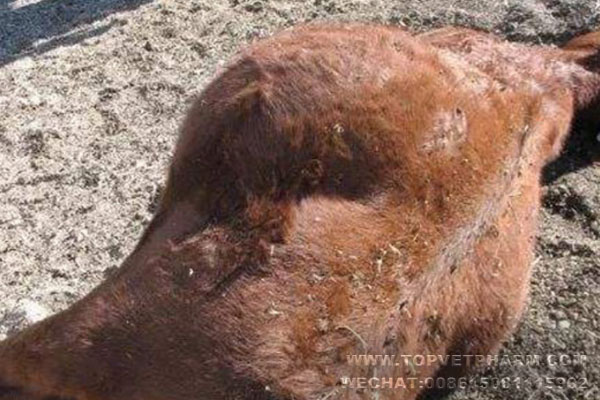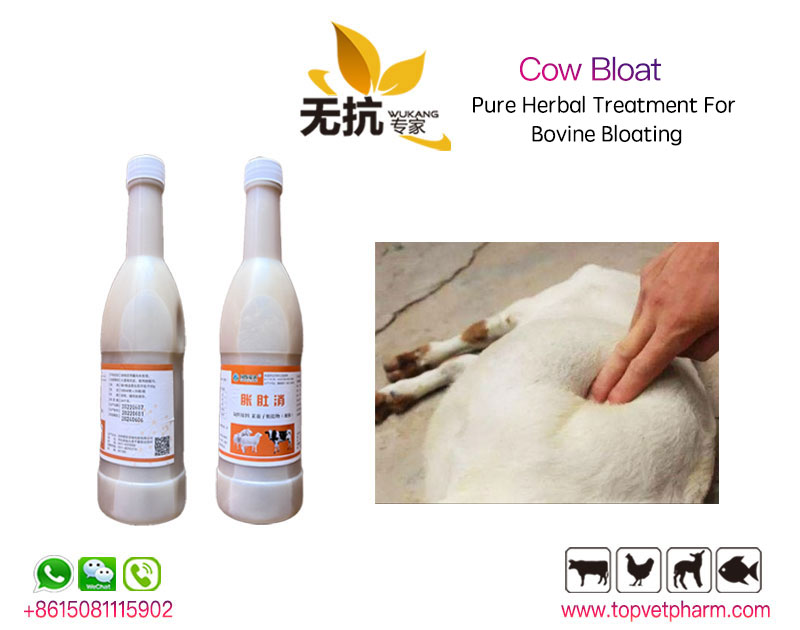Sep. 18 , 2023
Bloat in cattle and sheep, including calf bloat, is a condition characterized by the excessive accumulation of gas in the rumen (the first compartment of the stomach). This condition can be life-threatening if not treated promptly. Here are the reasons, symptoms, and some information on how to manage bloat in cattle and sheep:

Reasons (Causes) of Bloat:
Frothy Bloat (Primary Bloat): This type of bloat occurs when the rumen becomes filled with foam or froth. It can be caused by the consumption of certain lush, legume-rich pastures, such as clover and alfalfa.
Free Gas Bloat (Secondary Bloat): Secondary bloat can occur due to a physical obstruction in the esophagus or other issues that prevent the release of gas from the rumen.
Symptoms of Bloat:
The symptoms of bloat can vary in severity, but they often include:
Abdominal Distention: The animal's left side of the abdomen becomes visibly swollen and tense.
Difficulty Breathing: The pressure from the bloated rumen can make it difficult for the animal to breathe.
Restlessness and Discomfort: The animal may exhibit signs of discomfort, restlessness, or unease.
Excessive Salivation: Excessive drooling and foaming at the mouth may occur.
Respiratory Distress: Labored breathing and rapid breaths are common.
Lack of Appetite: The animal may refuse to eat or graze.
Collapse: In severe cases, an animal may collapse due to the pressure on the diaphragm and lungs.
Management and Treatment:
Call a Veterinarian: If you suspect bloat in your cattle, sheep, or calf, it's crucial to contact a veterinarian immediately for professional diagnosis and treatment.
Relieve the Pressure: In cases of frothy bloat, passing a stomach tube or administering an anti-foaming agent can help release the gas and relieve pressure from the rumen.
Restricter and Anti-bloat Supplements: To prevent bloat in high-risk situations, you can use bloat preventer supplements or feed additives that help reduce foam formation.
Slow Grazing Transition: When moving animals to lush pastures or feed with a high risk of causing bloat, make the transition gradual to allow the digestive system to adjust.
Grazing Management: Rotate pastures and avoid grazing cattle or sheep on legume-rich pastures when they are wet or during high-risk periods.
Monitor Diet: Be mindful of diet composition, especially for cattle and sheep susceptible to frothy bloat.
Surgery (in severe cases): In some extreme cases, surgical intervention may be required to alleviate bloat and treat any underlying issues.
It's essential to work with a veterinarian to develop a bloat prevention and management plan tailored to your specific circumstances. Bloat can be a life-threatening condition, so prompt action and proper care are crucial to ensure the well-being of your animals.
Treatment:
1.Fasted in sheep first .
2.Using a cannula, puncture and deflate the left side of the sheep's canine fossa (the highest part of the flatulence), paying attention to deflating slowly so that the sheep does not become unconscious.
3.Or Use Bloat Cure To Gavage.








